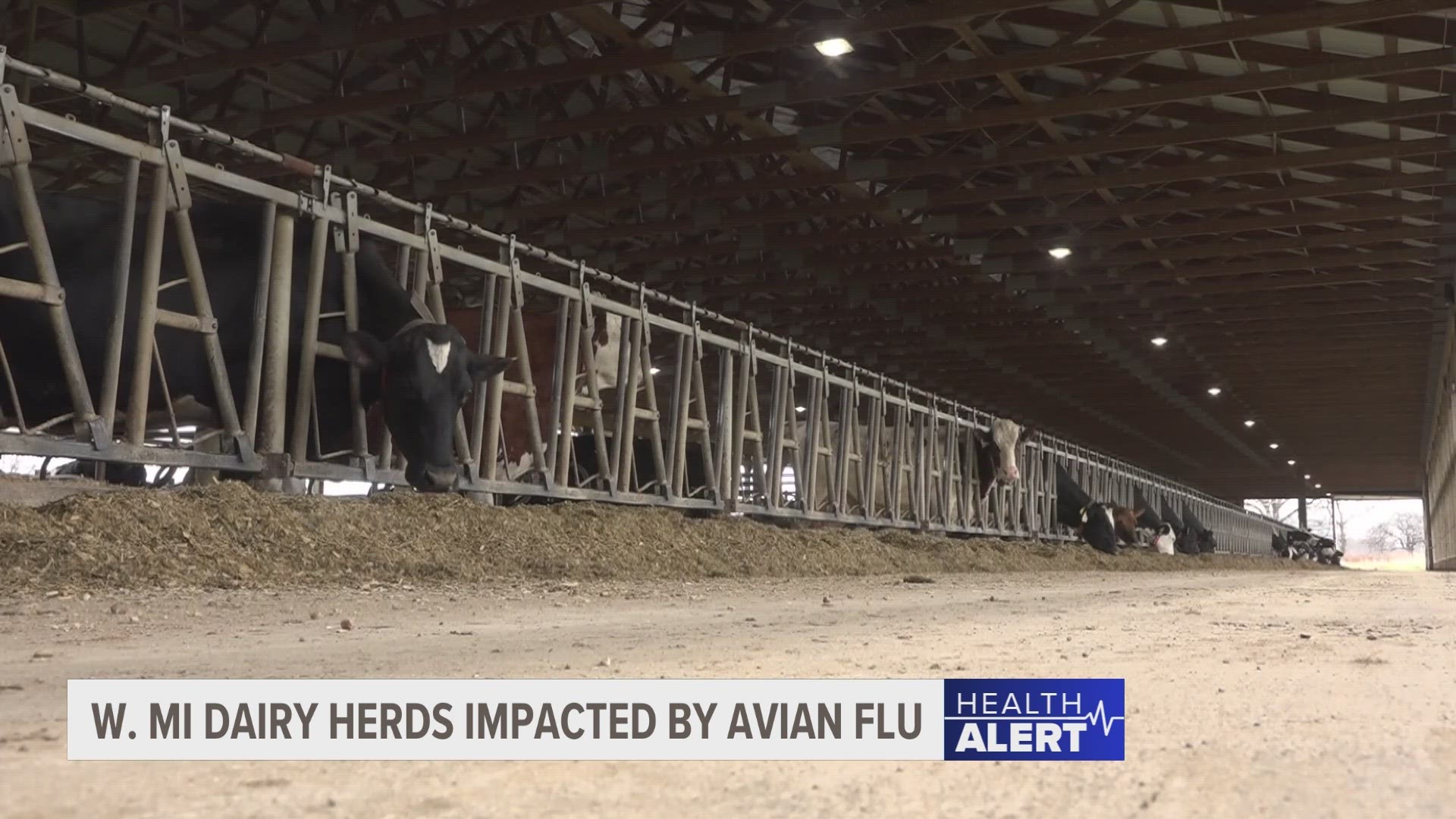LANSING, Mich. — There are now four dairy herds in Michigan that have been infected with the highly pathogenic avian influenza (HPAI), also known as bird flu.
The Michigan Department of Agriculture and Rural Development (MDARD) announced the new detection in Ionia, Isabella and Ottawa counties.
MDARD previously announced a herd in Montcalm County was impacted.
State officials said during a Friday afternoon briefing that the initial herd in Montcalm County had a history of movement of cattle from Texas.
Most of the impacted herds are greater than 500 animals. One impacted herd was considered "medium-sized."
MDARD Director Tim Boring said the U.S. Department of Agriculture (USDA) National Veterinary Services Laboratory confirmed the results.
"What is happening with HPAI in Michigan, mirrors what is happening in states across the country. This virus does not stop at county or state lines, which is why we must all be on high alert. This news is unfortunate and upsetting for our poultry and dairy farming families and communities," said Boring. "Experts from across the nation continue to assess this situation and provide insights into the role of HPAI in the affected livestock as they become aware. MDARD continues working with our federal, state, and local partners to respond robustly to this disease. Thanks to recent budget investments, MDARD is well poised to properly engage in this response. If you believe your livestock are showing clinical signs, contact your veterinarian immediately. We're all on the same team as we combat HPAI."
State officials said animals aren't quarantined. Instead, producers are asked to restrict movements and only move them if necessary.
If an animal is sick, the milk is not used.
Federal regulators say milk supply is safe
The USDA, the FDA, and the CDC all agree that the milk supply is safe because of federal animal health requirements and pasteurization.
Federal experts stress there is no concern about the safety of the commercial milk supply or that this circumstance poses any increased risk to consumer health.
Analysis of the virus from this case and the other cases of affected cattle has not shown any significant new adaptation to make the virus more transmissible between mammals.
Therefore, officials said the public health risk associated with HPAI remains low.
How to fight illness
Michigan law requires all milk sold in stores to be pasteurized. State regulators said pasteurization is clinically proven to inactivate bacteria and viruses, like influenza, in milk.
“HPAI doesn’t affect dairy cows the same way as it does with poultry. With proper veterinary care, cows are recovering. Biosecurity is the best line of defense. Still, we want to stress working with your veterinarian is fundamental for the recovery of affected dairy cows,” said State Veterinarian Dr. Nora Wineland, DVM, MS, DACVPM. “It continues to be vitally important for producers to work with their veterinarian, minimize the number of visitors to their farms, prevent contact between their animals and wildlife, and continue to monitor the health of animals vigilantly.”
Officials are urging farmers and producers to enhance their biosecurity measures to stop the spread of disease.
This includes limiting the amount of people that come onto dairies to employees and essential personnel.
Washing hands often is a great step as well.
You can learn additional biosecurity resources here.
How it spreads
State officials said the bird flu is spread directly by infected wild birds or animals or indirectly through any item that has been exposed to the virus.
That includes equipment, feed or clothing on caretakers.
The virus has been detected in various species of mammals, presumably after the animals come into contact with infected birds.
The farms impacted voluntarily stopped movement to limit the spread of disease.
What to do if you suspect disease in your herd
If you suspect the presence of HPAI or any other reportable animal disease in their domestic animals, contact MDARD immediately at (800) 292-3939 (daytime) or (517) 373-0440 (after-hours).
Producers who have questions about animal health should contact their veterinarian.
►Make it easy to keep up to date with more stories like this. Download the 13 ON YOUR SIDE app now.
Have a news tip? Email news@13onyourside.com, visit our Facebook page or Twitter. Subscribe to our YouTube channel.
Watch 13 ON YOUR SIDE for free on Roku, Amazon Fire TV Stick, Apple TV and on your phone.

